Ah, air conditioning! This technology is truly one of the wonders of our modern lifestyles—until it isn't. So, you are wondering what might be the problem if your central air conditioner stops blowing cold air. Well, you have come to the right post. Here we combine industry professional knowledge and up-to-date research to provide a thorough answer to your question.
Central air conditioning is generally achieved through either refrigerant or heat pump technology. Both of these technologies require complicated mechanical systems to operate, which include many components that can fail or malfunction. The following list describes the main reasons your central AC unit is not blowing cold air:
- Thermostat error
- Duct issue
- Clogged filter
- Obstructed outdoor unit
- Poor pressure balancing
- Low or leaking refrigerant
- Dirty evaporator coils
- Malfunctioning condenser fan
- Broken compressor
- Reverse valve malfunction
- Electrical issue
- Needs to be reset
Keep reading the rest of this post for more details on the above list of possible central AC issues. Overall, this post provides a good guide for troubleshooting and will help you know if calling an AC professional is 100% necessary. To conclude, we answer a few related questions.
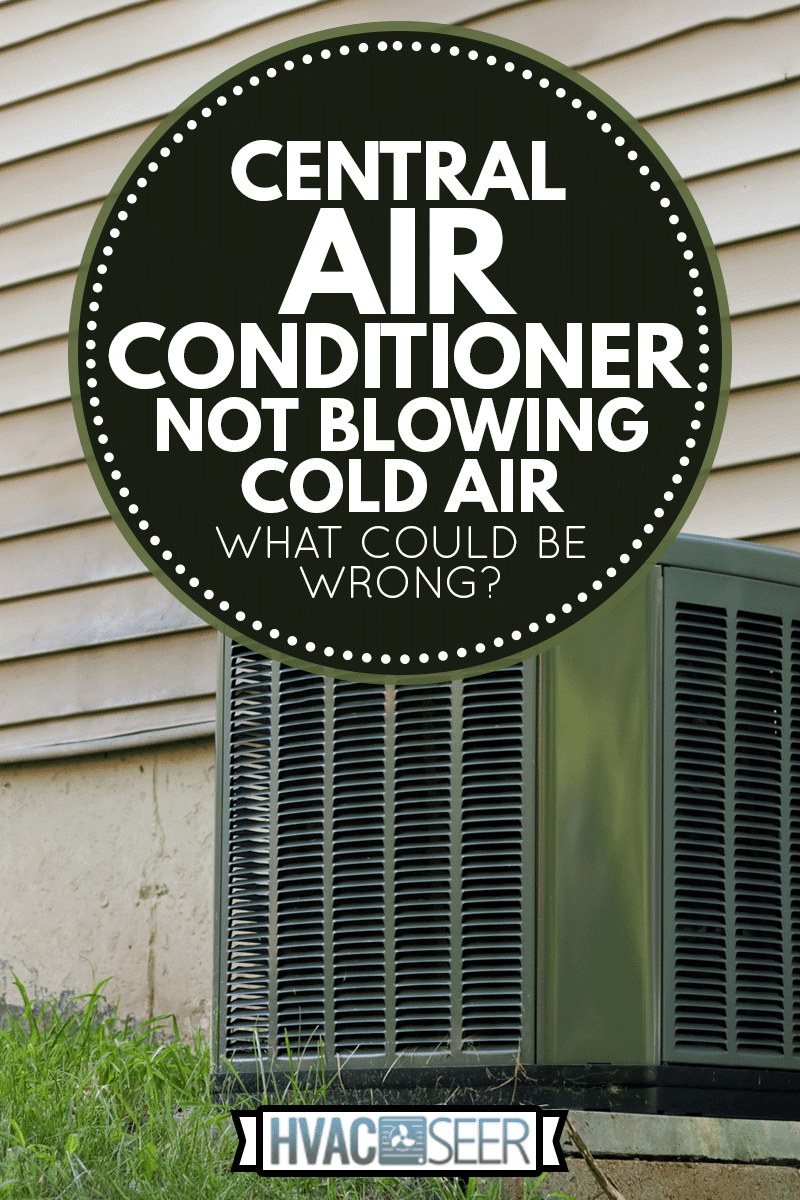
Main Reasons Why Your Central Air Conditioner Is Not Blowing Cold Air
Thermostat Error
The thermostat functions to sense the temperature in your home and then tells the AC system when to turn on. This means that if the thermostat is not functioning properly or set incorrectly, the AC system will not work.
First, ensure that the thermostat is set correctly. Sometimes a family member may have changed the settings, or perhaps the seasons have just changed. Usually, setting the thermostat to cool and make sure the fan is turned on.
If the thermostat is set correctly, it may be the case that it is malfunctioning. This means it is not sensing the temperature correctly or is not sending the right signal to the AC system. A thermostat malfunction requires the help of an HVAC expert.
Read this great article from HVAC Seer if you find that the thermostat keeps shutting off: AC Thermostat Keeps Shutting Off — What To Do?
Duct Issue
The duct system serves to carry the cold air to all the different rooms of your house. Perhaps your ducts are broken somehow, which lets hot air into the system and cold air out. Or perhaps your vents (also known as registers) are blocked by furniture or other obstructions.
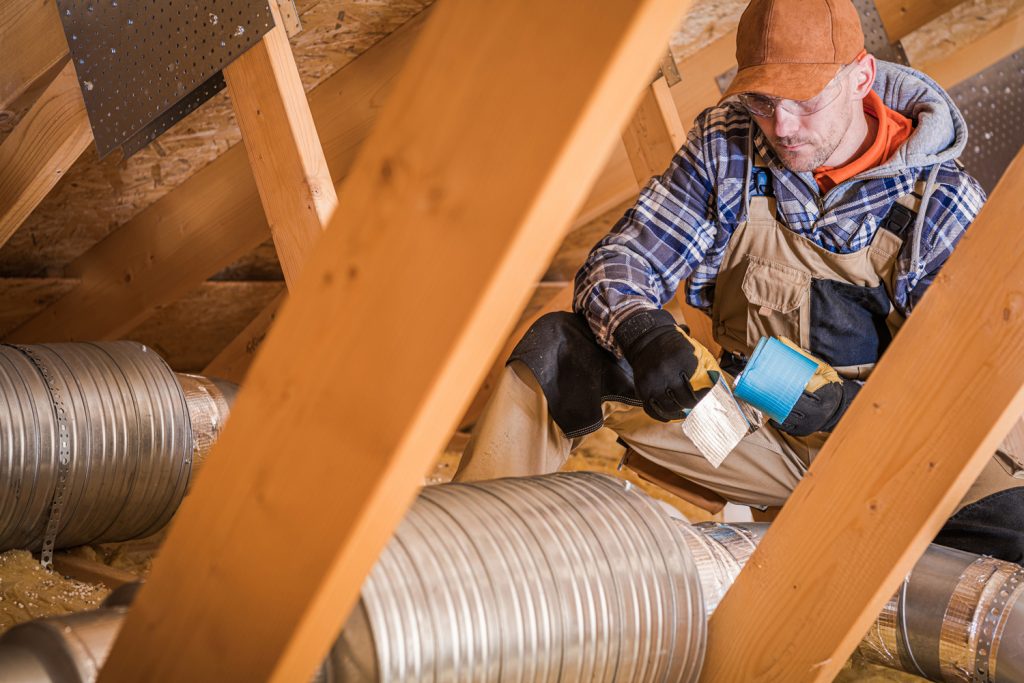
Duct problems are usually identifiable through visual inspection. Once you identify the issue, take steps to fix it. For more severe duct breakages, an HVAC technician is usually called.
If your duct system is in your crawl space or attic, be sure to wear proper personal protective equipment during the inspection.
Clogged Filter
Besides thermostat setting issues, clogged filters are one of the easiest AC system fixes. No matter the type of system you have, there is likely a filter that functions to remove dust and debris before it enters the workings of the AC system.
Click here for a common filter size on Amazon.
When these filters get clogged, which inevitably happens over time, the whole unit is starved of air and cannot blow cold as designed. Some filters can be washed in the sink, while other filters are disposable and must be replaced.
It is generally best practice to replace or clean your filter at least every two months or even more often as needed. Be sure to replace your filter with the proper size filter.
Obstructed Outdoor Unit
Similar to a clogged filter, an obstructed outdoor unit does not allow the unit to move the heat out of the air it cools. Rather, the hot air will stay in the outdoor unit which makes it much more difficult to blow cool air inside.
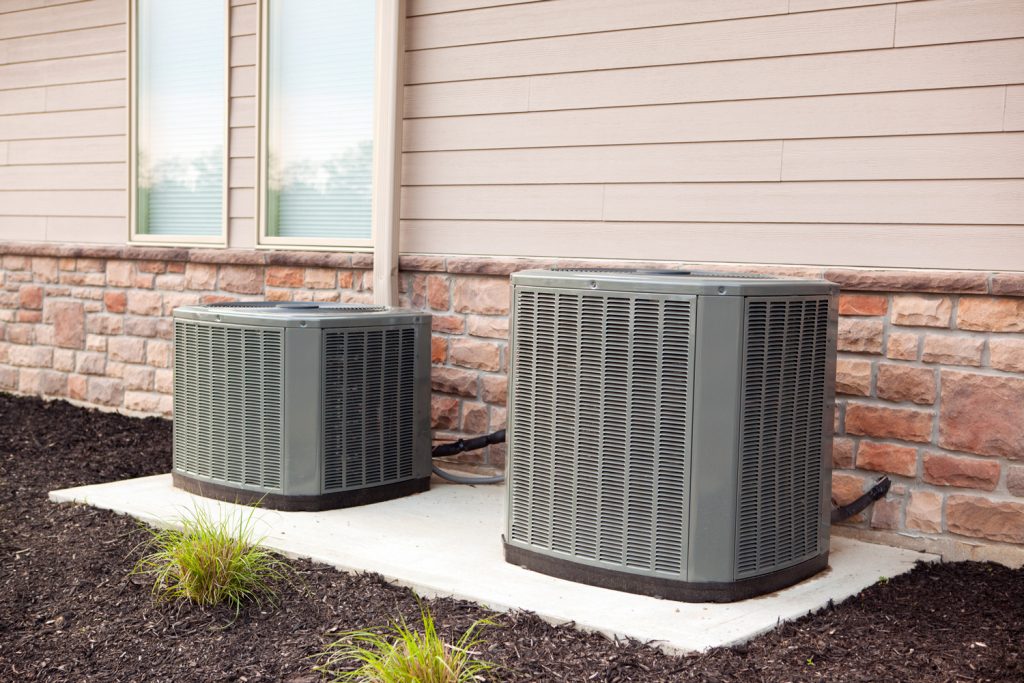
Common things that block outdoor units include piled leaves, other yard debris, and tarps. Simply remove any obstructions, and your unit may start to blow cold again. In fact, it is wise always to keep your outdoor unit clean to improve unit efficiency.
Poor Pressure-Balancing
Central air conditioning units function much more efficiently if they are asked to cool the indoor air instead of the hot outdoor air. If the system cannot suck the air back from inside, it will suck the air through cracks in your building construction.
A perfectly pressure-balanced system only sucks air from inside the home. Issues with pressure balancing usually stem from closed furnace closet doors or obstructed return vents.
Low or Leaking Refrigerant
Both standard and heat pump central AC systems use refrigerant. This refrigerant can slowly evaporate through microholes over time or can leak out through more serious breaks.
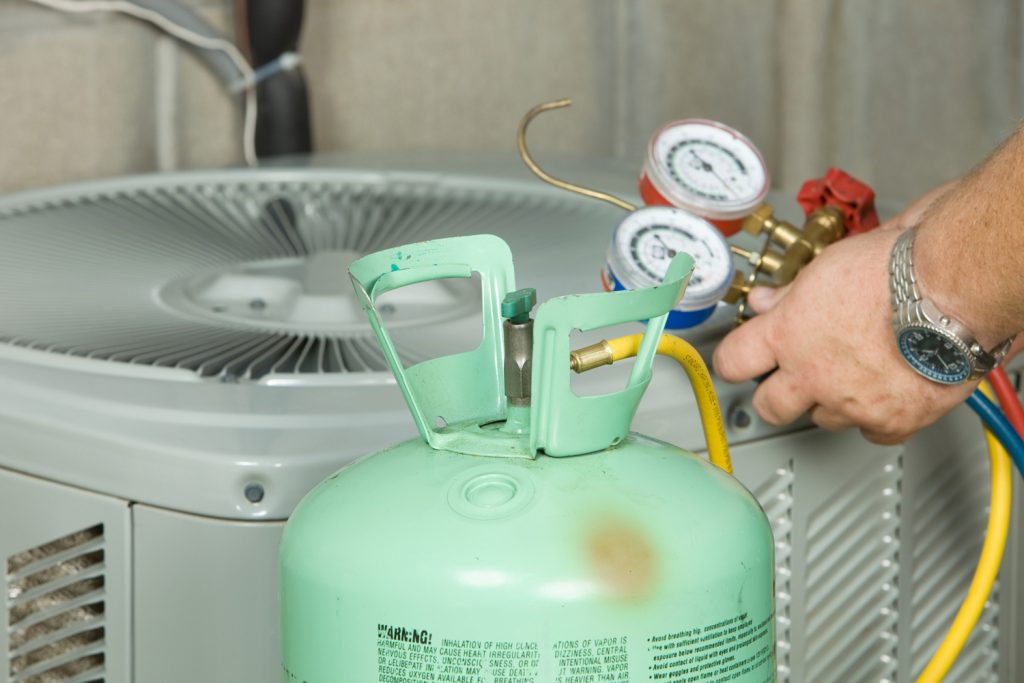
Unfortunately, unless the leak is obvious and large, it is difficult to know if low refrigerant is the cause of your poor cooling. Signs of this problem include loud noises from the unit, ice on the refrigerant lines, and unusually high utility bills.
If you suspect that you have low refrigerant, it is very important to call an HVAC expert as this material is dangerous and difficult to work with.
How do you know if your AC needs freon?
Freon is the most common refrigerant used in AC units. To identify if your unit needs freon, an AC technician will need to test the system pressure. Make sure they do not simply refill the system and instead ensure that they actually fix the leak.
Can I recharge the home AC by myself?
According to this FAQ from the EPA, freon is a dangerous chemical that can harm individuals and the environment if allowed to leak. For this reason, it is highly inadvisable to attempt recharging the system yourself.
Instead, call a local HVAC technician to fix the problem. Further, these experts have the skills and knowledge to identify exactly what the issue is.
Dirty Evaporator Coils
The evaporator coil is where the actual magic of AC happens. The coil is full of refrigerant, which absorbs the heat from your indoor air. If these coils become dirty, the heat transfer will become much more sluggish and inefficient.
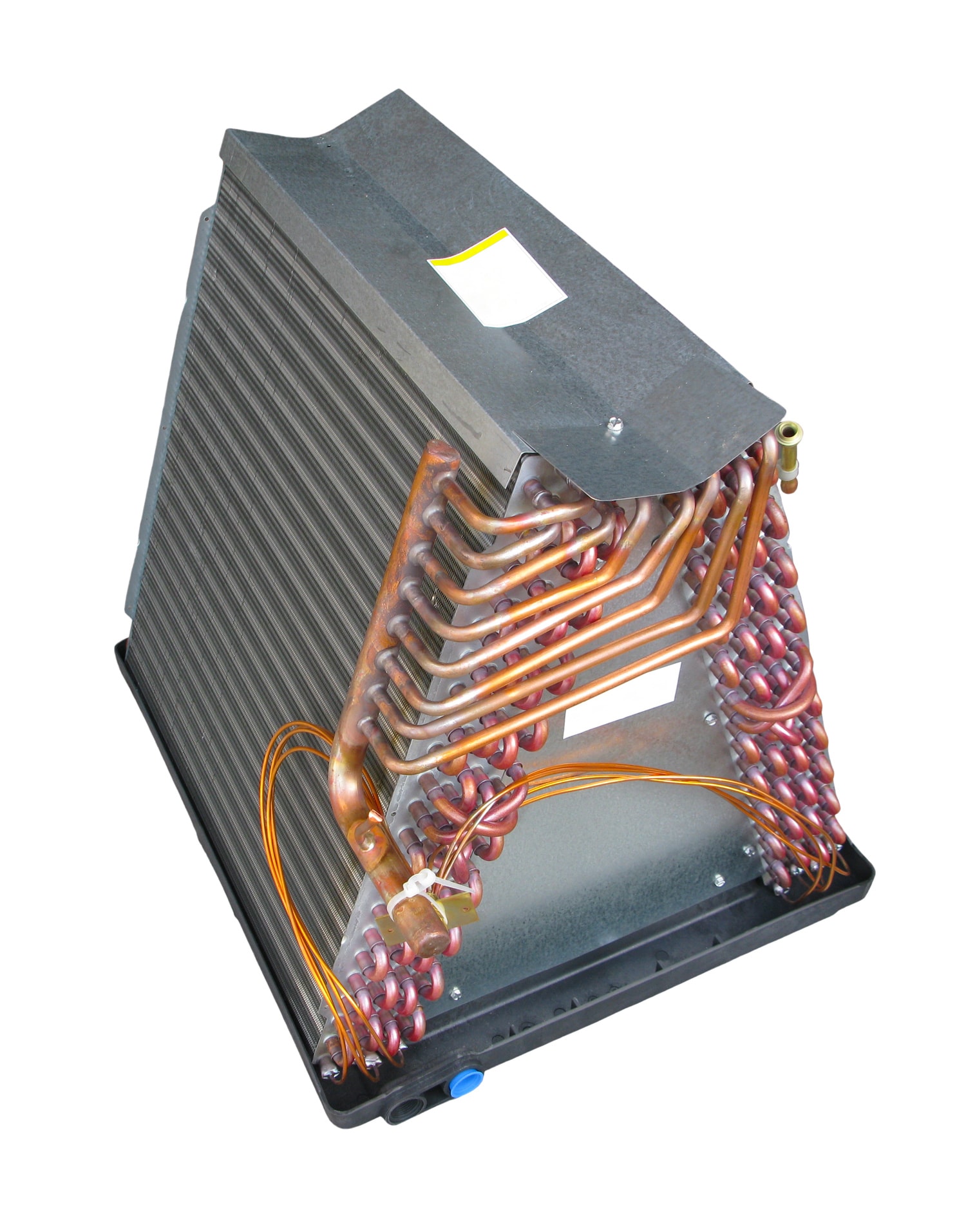
To clean your coils, use a mix of light detergent and water. Apply to the coils (be careful not to wet any electronics in the system). Then once the solution has worked for a few minutes, wipe off with a clean rag. Repeat until the coils are dirt, mold, or mildew-free.
Malfunctioning Condenser Fan
The condenser is the more technical term for the outdoor portion of your AC unit or heat pump. The condenser fan is specifically the fan that moves air across the coils to facilitate the heat transfer.
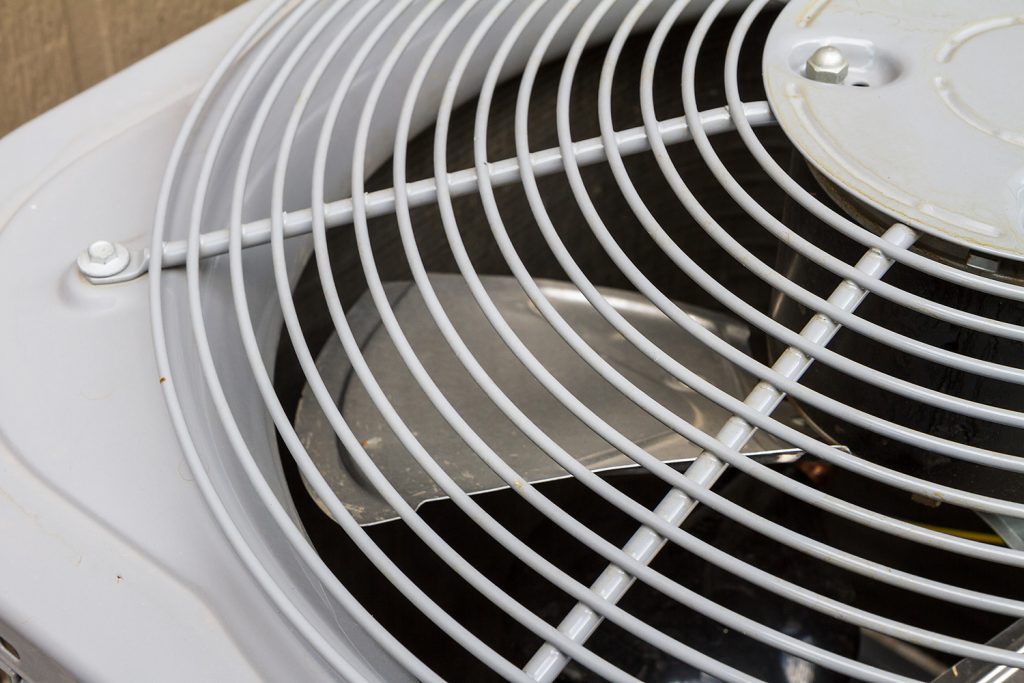
You have a condenser fan problem if your outdoor fan is not blowing while the AC is on. Usually, this requires calling an HVAC technician who can determine the specific source of the problem.
Reverse Valve Malfunction
Heat pumps have reverse valves that change the direction of the unit depending on whether heating or cooling is called for. Sometimes, these valves cease to function properly. This may cause your unit to pump out heat, even if the cool setting is selected on the thermostat.
Unfortunately, this is another issue that requires an HVAC technician to fix because the problem may be a bad valve, no power to the valve, or even another issue.
Electrical Issue
If any part of your system, or the whole system, is not getting electricity, the unit will fail to blow cold air. When this happens, you can first check the breaker. If it is popped, flip it back. If this does not fix the problem immediately, reflip the breaker and call an HVAC technician.
How do I reset my air conditioning unit?
Often, AC units have built-in safety systems that shut the unit off or part of the unit off if there is a serious problem. Sometimes, fixing this requires simply resetting the system. Before calling an HVAC expert - take the time to reset your system.
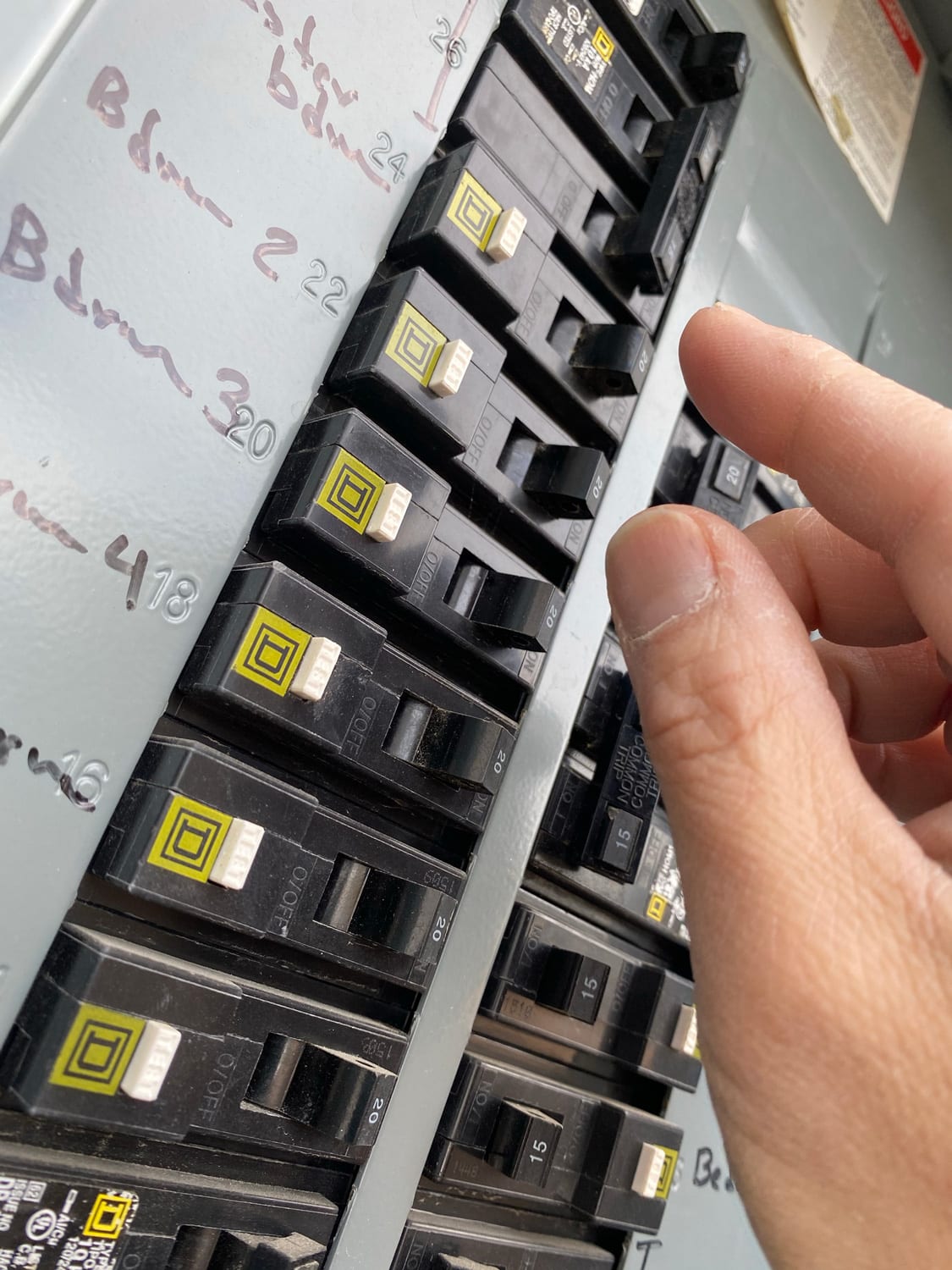
First, turn the unit all the way off at the thermostat or with the remote. Then, find the proper breaker and flip it. Wait at least 30 seconds and then reflip the breaker and turn the system back on. That is all it takes to reset the AC unit.
To learn how to reset a Goodman furnace, read this HVAC Seer article: How To Reset A Goodman Furnace
Should I turn my AC off if it's not cooling?
Yes! If your AC unit is not properly cooling while it is on—turn the unit off immediately. Often, leaving the unit on will serve to exacerbate the problem.
If you attempt one of the simpler fixes outlined above—turn the unit on briefly. If it does not start to cool, turn it right back off again.
How can I make my central air conditioner colder?
Making your central air conditioner unit colder requires performing regular maintenance and regularly switching out filters. This includes cleaning both the indoor and outdoor units as well as the duct and register system.
Otherwise, take the time to check all of the issues outlined above to help the unit blow colder. Finally, it is advised to hire an HVAC technician to clean and tune the system at least every 12 months.
When to Repair your AC Unit?
Generally, it is best to repair your AC unit when it breaks. However, every heatwave comes with an overwhelming workload of repairs for HVAC companies. Because of this, it is wise to test your system before the heat really cranks up.
This way, you can be sure to have access to a licensed repair person before the issue becomes an absolute emergency.
In Closing
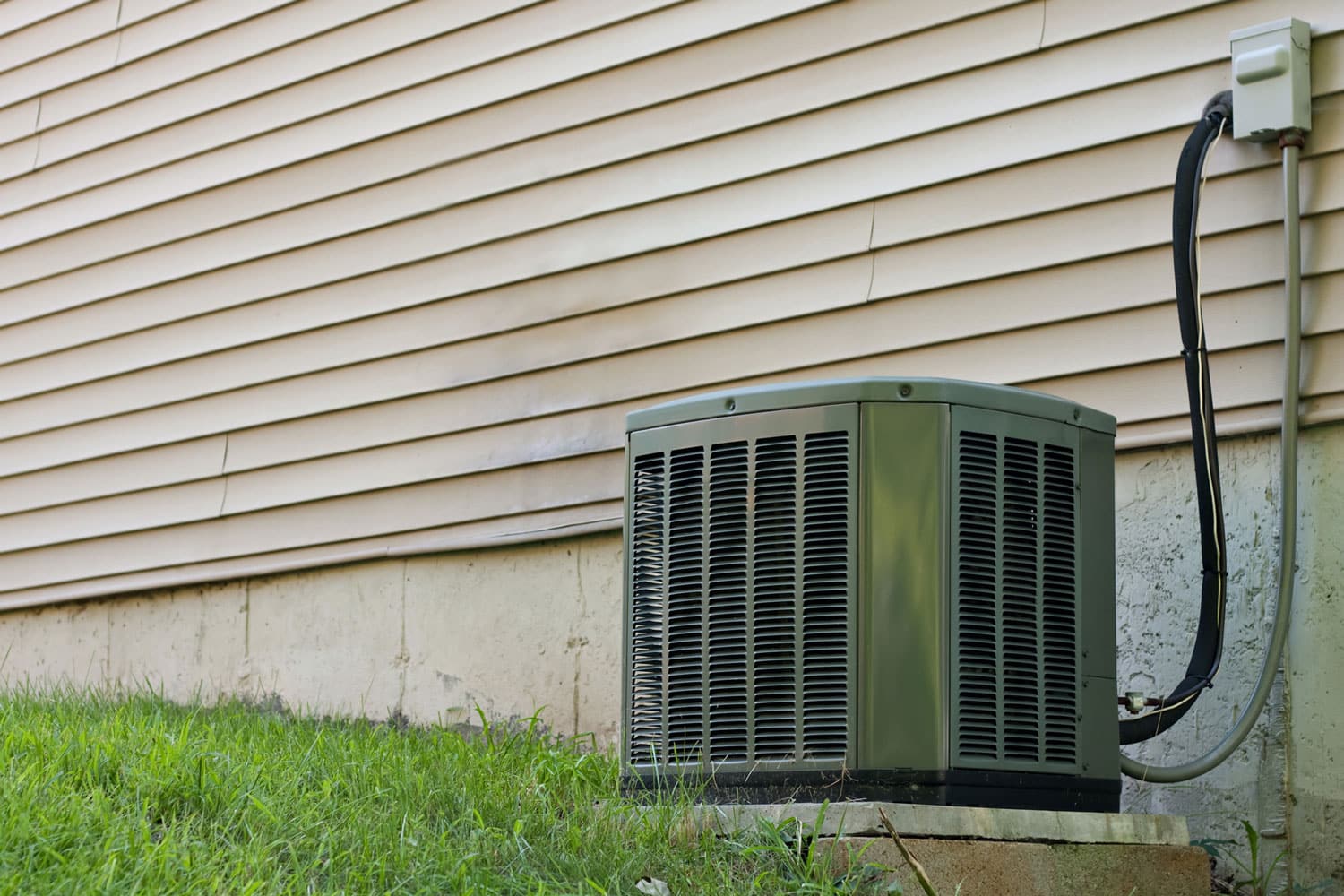
In this post, we answered the question of why your central air conditioner is not blowing cold air. We covered the main issues that can cause an HVAC system error and what steps to take to fix those problems. To conclude, we answered a few related questions. Good luck!

